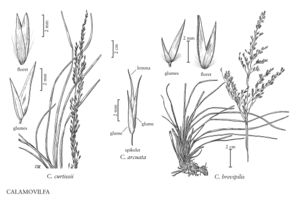Difference between revisions of "Calamovilfa curtissii"
imported>Volume Importer |
imported>Volume Importer |
||
| Line 43: | Line 43: | ||
|publication year= | |publication year= | ||
|special status=Endemic | |special status=Endemic | ||
| − | |source xml=https:// | + | |source xml=https://bitbucket.org/aafc-mbb/fna-data-curation/src/2e0870ddd59836b60bcf96646a41e87ea5a5943a/coarse_grained_fna_xml/V25/V25_706.xml |
|subfamily=Poaceae subfam. Chloridoideae | |subfamily=Poaceae subfam. Chloridoideae | ||
|tribe=Poaceae tribe Cynodonteae | |tribe=Poaceae tribe Cynodonteae | ||
Revision as of 22:04, 5 November 2020
Rhizomes short, covered with the persistent bases of the foliage leaves. Culms to 2 m. Sheaths to 30 cm; ligules to 0.5 mm; blades to 50 cm long, 2-5 mm wide. Panicles to 50 cm long, about 3.5 cm wide, contracted; branches to 20 cm, erect. Spikelets 3.5-5.4 mm. Glumes straight; lower glumes 2-4.7 mm; upper glumes 3.5-5.4 mm; callus hairs 1/4 - 1/2 as long as the lemmas; lemmas 3.5-5.2 mm, straight, lightly to markedly pubescent; paleas 3.5-5 mm, slightly to markedly pubescent; anthers 2.5-3.1 mm. 2n = unknown.
Discussion
Calamovilfa curtissii is a rare species, although sometimes locally common. It is restricted to two disjunct regions in Florida. Most Gulf coast populations grow in moist flatwoods or adjacent to wet cypress depressions; Atlantic coast populations occur in interdune swales.
Selected References
None.
